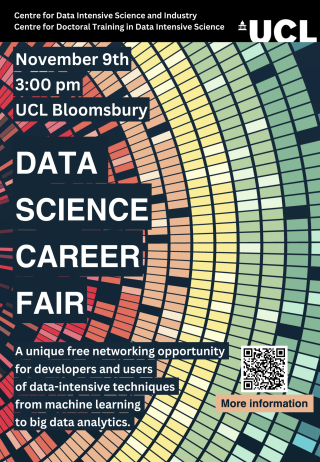News & Events
Search here results
search-total-matching3search-total-matching- Leading in Collaborations Program | UCL's Centre for Data Intensive Science - UCL – University College London
- Data Science Career Fair | UCL's Centre for Data Intensive Science - UCL – University College London
- November Partner Event | UCL's Centre for Data Intensive Science - UCL – University College London
Please enable JavaScript to use this page or visit this page for a non javascript version.
Past Seminars:
- Seminar Archive
Seminars 2022
13-Jan-2022: Chu Lun Alex Leung (Department of Mechanical Engineering, UCL & Rutherford Appleton Laboratory, Harwell ), A Journey To Data-Driven Reliable Efficient Additive Manufacturing (DREAM)
Powder bed fusion (PBF) additive manufacturing (AM) produces complex net-shape parts from powder feedstock, in a layer-by-layer manner. This emerging technology produces functional products that serve a wide range of industrial sectors, including architecture, aerospace, automotive, biomedical, energy, etc. However, AM parts are not often used as safety-critical components, e.g. turbine blades or propellers, owing to the presence of imperfections, e.g. pores and cracks. This presentation will first review the history of using 3D and 4D X-ray imaging to examine AM parts. I will then deep-dive into my journey of the development and application of a ‘physical twin’ of the AM process, ultrafast synchrotron X-ray imaging, machine-learning image processing, and high-fidelity simulation to monitor and elucidate the process dynamics during PBF. We use these tools to quantify the process dynamics, e.g. changes in keyhole geometry, porosity, and remelting zone, as a function of time, layer number, and local layer thickness. After that, we compare our data with a multiphase and multiphysics simulation to reveal the solid-liquid-gas-metal vapour interaction, evolution mechanisms of the keyhole, melt pool, and porosity. This talk highlights the importance of imaging and data analytics in gaining novel insights into the AM process and possible ways to make manufacturing technologies more reliable and efficient.
10-Feb-2022: Anna Scaife (Professor of Radio Astronomy at the University of Manchester, where she Heads the Jodrell Bank Interferometry Centre of Excellence and an Academic Co-Director of Policy at Manchester), AI in the SKA Era: Challenges for Recovering Well-Calibrated Uncertainties from Bayesian Deep-Learning
The expected volume of data from the new generation of scientific facilities such as the Square Kilometre Array (SKA) radio telescope has motivated the expanded use of semi-automatic and automatic machine learning algorithms for scientific discovery in astronomy. In this field, the robust and systematic use of machine learning faces a number of specific challenges, including a paucity of labelled data for training (paradoxically, although we have too much data, we don't have enough), a clear understanding of the effect of biases introduced due to observational and intrinsic astrophysical selection effects in the training data, and motivating a quantitative statistical representation of outcomes from decisive AI applications. In this seminar, I will talk specifically about the challenge of recovering well-calibrated uncertainties from Bayesian neural networks when classifying radio galaxies, a canonical example of a radio astronomy AI application. I will discuss how both model and likelihood misspecification can affect this calibration, how these effects potentially contribute to the cold posterior effect seen when building models using real astronomical data, and how error calibration can be affected by domain shift between labelled and unlabelled datasets.
10-Mar-2022:James Hetherington (Director of ARC, UCL) Introducing UCL ARC, A New Kind of e-Science Research and Innovation Centre
In this talk, Professor James Hetherington, Director of UCL’s new Advanced Research Computing Centre, will talk about the vision for the department as an unusual hybrid: a support centre providing supercomputing platforms that enable computational science in UCL and beyond, a home for pools of research technology professionals (research software engineers, data scientists, informaticians and data stewards) contributing to UCL research teams, and a research institute in the methods of digital research. He will look at factors which limit the progress of digital transformation in research, consider how the new model proposed for the centre may help, and review the risks that may prevent success.
7-Apr-2022: Gabriel Facini (Data-Intensive Science and Industry [DISI], UCL), A View of the ATLAS Experiment in Preparation for Run 3 and Beyond
ATLAS, a flagship data-intensive experiment, is in preparation for Run 3 of the Large Hadron Collider. The seminar will review recent results in the hunt for beyond the Standard Model physics, challenges of the charged particle reconstruction, prospects for innovative use of advanced DIS techniques, and long-term challenges.
12-May-2022: Adham Hashibon (Data-driven innovation, Materials Modelling, UCL), Materials Digitalisation: what is an ontology and how it can be utilised in data intensive domains
In this presentation, an introduction to foundations of semantic interoperability and ontology is given. Specifically, the Elementary Multi Perspective Materials Ontology (EMMO) as basis for digitalisation frameworks is introduced along with a short survey of existing digitalisation tool, including the SimPhoNy – Integrated Simulation Framework.
 Close
Close


